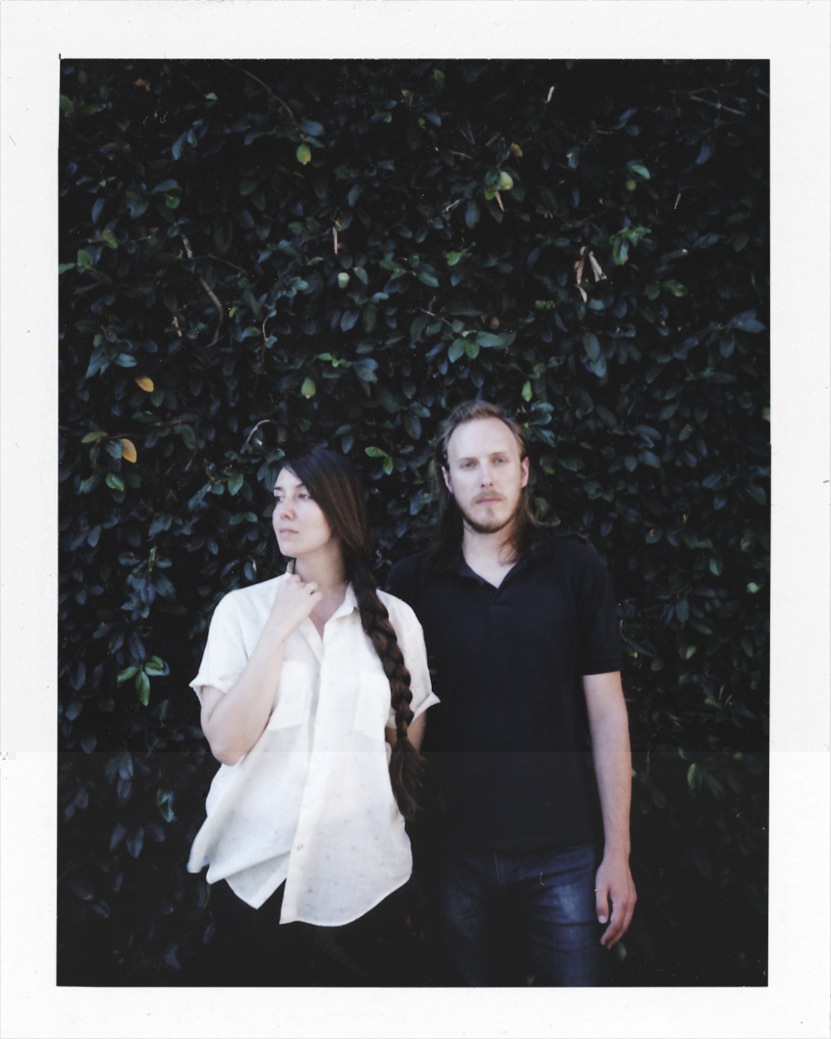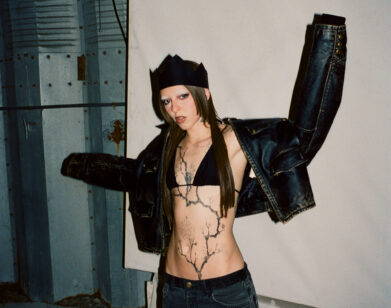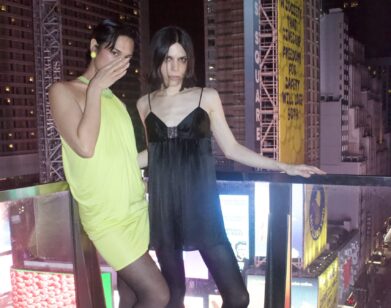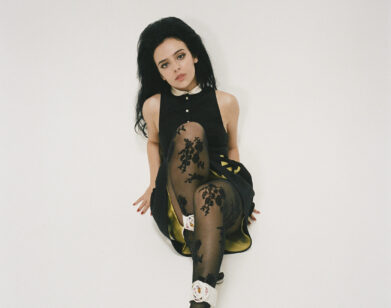The Radiance of She Keeps Bees

ABOVE: SHE KEEPS BEES’ JESSICA LARRABEE (LEFT) AND ANDY LAPLANT. PHOTO COURTESY OF MAGGIE DAVIS
In conversation, it’s immediately apparent that Jessica Larrabee and Andy LaPlant of She Keeps Bees possess a synthesized energy—one that also permeates their recordings and live performances. With LaPlant on drums and Larrabee on guitar, the duo has shaped a musical legacy woven of passion and ripples of raw emotion.
Since forming in 2006, Larrabee and LaPlant have pushed the boundaries of a two-person setup to cultivate a sonic space both intimate and revealing. With their fourth album Eight Houses, Larrabee and LaPlant showcase a spectrum of sounds ranging from the gentle rhythms of “Owl” to the blues-tinged, cathartic unleash of “Raven.” Sharon Van Etten’s appearance on “Is What It Is” feels just right, as she lends her vocals to a gorgeously serene mood. She Keeps Bees has created a world of gorgeous and hypnotic melody, with Larrabee’s voice taking intimate turns while slipping between meditative rhythms and assertive riffs.
We recently met with Larrabee and LaPlant at Cariño in Williamsburg, Brooklyn, where we talked about the new album, meeting Sharon Van Etten via Myspace, and Janet Jackson. You can preview the album below.
J.L. SIRISUK: How has your day been?
ANDY LAPLANT: Good. We did a couple interviews this afternoon for local places around the country, and then we rehearsed for a while. We have a guitar player that’s playing with us, so he’s still kind of learning some new songs and figuring out parts for the ones that we’re still working on.
SIRISUK: How long are you in town for?
JESSICA LARRABEE: Only until Saturday morning. Buffalo is our first date and we’re just hauling ass to the West Coast, pretty much. Buffalo, Chicago, Minneapolis, Grand Forks, South Dakota, and Spokane, Washington. It’s like, “17 hours, no problem.” [laughs]. But it’s good. It’s really beautiful out there.
SIRISUK: I know the both of you aren’t from New York, but you met in Brooklyn. You’re from D.C., Jessica, and you’re from…
LAPLANT: Wisconsin.
SIRIUSK: So what brought you out here initially?
LAPLANT: I moved here after college, just sort of finding a job in the audio industry doing engineering or recording bands or whatever I could find. When I met Jess, she was working at the bar across the street from my house.
LARRABEE: I moved from Philadelphia to New York in 2003 and was working at some places that were terrible, and then the blackout happened and like, you know, when you just take the subway and the subway isn’t there anymore and you’re like, “How do I get to Brooklyn? Just follow the masses of people walking.” Just to do music, that’s why I moved here. Then I got all this stuff stolen and had to work again to get my guitar back and amps and all this stuff. So it was a really long journey to start the music again from where it was kind of easy.
LAPLANT: She had it difficult when she moved here, and I had it very easy, I think. I met her right away. I got a really nice apartment.
SIRISUK: So when you guys met, how did the music happen?
LARRABEE: We became friends because we had similar music taste.
LAPLANT: Initially she was just recording her by herself. She would play all the instruments and do everything herself, and I would just record it.
SIRISUK: So you started out doing the engineering stuff.
LAPLANT: Yeah, and gradually worked my way into the band after I got better at drums.
LARRABEE: My father was a drummer, so that was my first instrument. I was in high school bands playing drums, so I was like, “You can do it. You play guitar, you can play drums.” So we learned and got stronger and stronger together. You know, we have the mind-meld down, that kind of language that starts to develop.
SIRISUK: Did it take time to build or did you feel it instinctively right away?
LARRABEE: It’s funny, because I don’t think he really took himself as the artist that he is, and it took some convincing. I think he definitely was like, “I want to be more in the background. I’m gonna record you. I don’t need to be on stage.” But there was something about it where I could see that when he would put his mind to something, it was like complete focus and dedication, and so I just knew that that would be something I wanted to develop in him too. I wanted him to believe in himself. You know when you try to be something and you’re like, “I’m trying, I’m trying.” But you’re not even telling yourself that you are. So I think for a while, I was trying to sound like something else not really developing my own voice.
SIRISUK: At that time, who were you trying to sound like?
LARRABEE: It was a combination of singer/songwriters. I loved Jason Molina from Songs: Ohia. He’s amazing, and Cat Power or just the way that she could evoke so much emotion. It wasn’t this labored way that she would do it, it was just very natural. With Andy, I was allowed to sort of lose all of that preconception and just focus on what was coming out, and really carve that aspect. So he really allowed me to be the musician that I wanted to be, and I think that it was really nice to find that. Also, you’re on tour and being with someone all the time, you better be able to connect and have that chemistry be strong because there’s petty stuff like driving or directions [laughs].
SIRISUK: When did you start playing the drums?
LAPLANT: I had some stints in middle school where a friend left drums in my house for a month and I would play them every night and annoy my mother. [laughs] But other than that I had very little experience with drums and then Jess had a kit, so we would just play stuff at home and it happened really naturally. I started seriously practicing with you [looks at Jess] and one day you were like, “Hey, let’s do a show.”
LARRABEE: [laughs] We’re doing a show!
LAPLANT: And I was like, “No way. I’m not ready for that yet!” I was definitely not very confident in the beginning.
SIRISUK: Do you remember how it felt the first time the two of you sat down and played music together?
LAPLANT: It started when we moved in together and then we started making our second record Nest. I think that was definitely the one where we were doing it as a band.
LARRABEE: On the first album, I played all the instruments and he just recorded, and then we started playing those songs live. It wasn’t until the second album that we gave each other credit for it. Before that it was like, “I don’t know how this happened,” and then that was released in Europe, and we were allowed to go over there and sort of be an exotic bird. You know, “Oh, Americans!”
SIRISUK: What about the first time you performed live together?
LAPLANT: We played at a small festival of friends’ bands in upstate New York.
LARRABEE: Yeah, it was beautiful.
LAPLANT: And it was a really comforting atmosphere because it was really friendly and it wasn’t nerve-wracking.
LARRABEE: We were surrounded by trees. It was really magical.
SIRISUK: I know that at one point you recorded in the Catskills. So what about the current album, where was it recorded?
LAPLANT: We did a 180. We recorded the third album upstate in a cabin, and then the most recent record we did at a studio in Greenpoint. Totally different atmosphere, and actually had a producer and an engineer so I didn’t have to do any of the recording.
LARRABEE: Poor thing. He’d be at the computer and run to the drum set and run back. This is the first time we were allowed to just be the creators and not have to worry about how the mic was messing up, that kind of thing. Just having Nicolas, the producer, be able to have this outside view of the song and be able to help us break it down and built them back up.
SIRISUK: It has just been the two of you before.
LARRABEE: Just the two of us and then we’d get done with it like, “Here’s the album. What do ya think?” [laughs].
SIRISUK: What was the process like? How long did it all take?
LARRABEE: I want to say I was writing all these other songs right after Dig On came out, like “Owl” and “Is What It Is” was coming about from 2011, and then my dad was sick so we moved back home from Brooklyn to Maryland. We were just taking care of family and just being in that mode and we lived in a basement [laughs], and we live in a basement now.
SIRISUK: You’re still in Maryland?
LARRABEE: Yeah, and not really having any space to ourselves. I was writing in the laundry room. That was the only place that was kind of quiet and after a while there, I was like, “I don’t know if this is gonna happen,” because I like to be alone when I do that. But I’m always writing and writing. The singing and playing, I wanna be somewhere where no one can hear me mess up and, you know, figure it out. It all kind of came together very nicely once we really started. Kind of like, “Okay, the time is booked. Have to prepare for that.”
LAPLANT: It was really all thanks to our manager. He was the one kind of pushing us towards making another record and figuring out how we were going to do it because we always recorded at home. So since we didn’t really have a place to do that anymore, we had to get a studio.
SIRISUK: You said you like to spend some time alone, so when you write do you tend to spend time apart or do you write jointly?
LAPLANT: She pretty much writes the songs and then brings them to me and I’ll sort of help her flesh them out from there. But they’re pretty much done when they get to me [laughs]. I just try to not change it as much. Actually, Nicolas did a lot of suggestions for changing things that I think really helped a lot.
SIRISUK: You think without him it would have sounded different?
LARRABEE: Yeah, there were so many songs that we actually didn’t record because they were very aggressive, and so if we had done all these aggressive songs, it definitely wouldn’t have been the album that it was. There were more tender things that he was pulling out of us, so I think that worked nicely.
SIRISUK: Some writers don’t read other books when they’re working on something and some musicians some don’t listen to other albums when they’re recording. In the process of making this album, were there any things that added a little bit of inspiration?
LARRABEE: Most of the songs are kind of about struggling with the heart’s desire and heart’s enthusiasm and trying to navigate what your life meaning and path should be. If it matches the person that you are, and if it’s self-sustaining. And then the other parts of it were a lot of stories that I started reading once. We did this tour back in 2012 and we were just driving and driving across America. We had been in the U.K. and had been in Europe, but when I came back to the States we hadn’t really done that. The more Native American stories that I read, I wanted to know more. We found all these atrocities, and like, the Custer guy— he’s still a war hero, and he was awful, and no one talks about this. I was looking at these Native American portraits, and like how the assimilation process was like, “Cut your hair, cover your body, don’t speak your language.” I wanted to make people feel like what that feels like. That micro to macro that is happening all over the earth. I feel like language is a heart memory and when you speak your native tongue again, you are allowed to connect to that culture. It gives me chills because I think there’s so much that holds in the words.
SIRISUK: Going back to where you two grew up, do you remember the role music played in your lives and the first albums you really loved?
LAPLANT: In high school I listened to punk rock, cathartic, sort of loud stuff. I got into more nuanced music in college, but music has always been a huge part of my life. There was this small venue where I grew up that had bands around all the time and little bands from town played. I was in a band and we could open up for touring groups and it was nice that we had that.
LARRABEE: Yeah, it was community.
LAPLANT: It gave me something to do, stay out of trouble.
LARRABEE: People need that. In D.C., I was close enough to see shows and stuff, and there was a little club that was close by and it was always all ages, which was awesome. My dad was a drummer, so music was always in the house. My dad played in funk bands and R&B and stuff, so he put records on and I tried to do Janet Jackson moves, like, “Check this out.”
SIRISUK: Was there ever an album that you listened to all the time?
LARRABEE: Oh my god… I wanna say…
LAPLANT: It’s like, “Nirvana, Nirvana!” [laughs] That’s like the only thing I’m drawing from 14 to 18.
LARRABEE: I loved Alice in Chains, too.
SIRISUK: I was listening to your album again last night, and I love that sense of unleash on “Raven.” What can you share about this track?
LARRABEE: I really wanted to focus on pulling from the root, that kind of self-sabotage, that self-doubt, that plagues the brain sometimes—more like a poison or like a spell. You put it on yourself, and it really has to come from a deep sense of letting these things fall off you. All of this interference is happening and something else happening, I don’t know what it is. I think that that kind of thinking has kind of plagued me for a long time.
SIRISUK: Shannon Van Etten is on a few tracks. How did this come about?
LARRABEE: She’s been a friend of ours for a long time, and we actually met on Myspace. She sent her music along and I was completely blown away and crying and like, “Yes, please. Let’s be friends,” and we realized we were neighbors. Then we’d just go over to each other’s houses and work on songs and make food. But we actually made a song together—it was her song, and I sang on it, and I really loved the way our voices sounded. So she came over and listened to the song and just did it really quick. She’s such a professional and her energy is so supportive and loving. It was just nice to have her listening to the songs and kind of reassure me that things were sounding good.
SIRISUK: The video for “It Is What It Is” has a tranquil quality to it. I know Sharon sang on that track. In terms of the video, did you have a say in any part of it?
LARRABEE: I was so happy that Keith (Musil) came up with this idea himself. He got it, and the story he had was really compelling in the simplest way, which I feel I respond to more. It’s not like “hit you over the head,” but it’s just these small moments I think that are really powerful. He had this idea, so we fell in love with it.
SIRISUK: Even though you joke sometimes between songs, you seem to enter another zone when you’re singing. I was wondering how you feel. Can you describe that place you go to?
LARRABEE: I think that definitely comes from a place of “have-to,” like a release. I think I knew from pretty early on that that was something I was supposed to do, so it feels comfortable in the funniest sense of comfort. It’s still kind of frightening because you’re teetering on this edge and you have to be present. The energy, at least for me, I have to be aware of and give the songs—to honor them the way I think music should be honored.
EIGHT HOUSES IS OUT TOMORROW, SEPTEMBER 16. FOR MORE ON THE BAND, PLEASE VISIT ITS WEBSITE.






